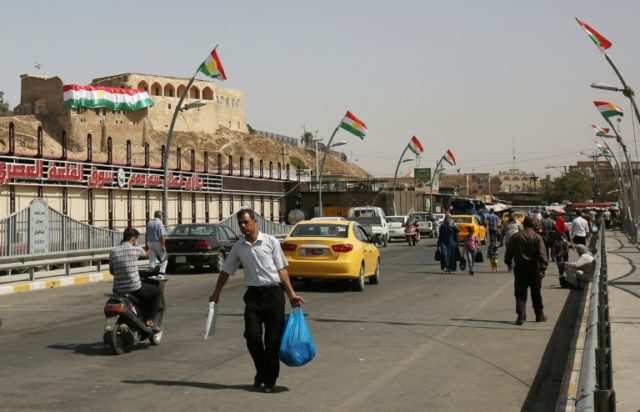Residents of a disputed district of Kirkuk, a region claimed by Baghdad and northern Iraq’s autonomous Kurdistan Regional Government (KRG), are accusing federal police-backed Arab settlers of confiscating Kurdish lands, Rudaw reported Monday.
“We are calling on the Kurdish officials to come to our aid and not let our land be occupied and for us to become refugees,” Arshad Sabah, a resident from the disputed region, told Rudaw, adding that “imported Arabs … are trying to occupy” three villages in Daquq, a disputed district of Kirkuk claimed by Baghdad and the KRG.
Rudaw reported,
Arab settlers brought by the regime of Saddam Hussein to Kirkuk and then compensated by the Iraqi government to return to their areas, are returning to Kirkuk … The Arab settlers have the backing of the federal police and are using the courts to threaten locals to leave their homes … Consecutive Iraqi governments had long engaged in the demographic change in oil-rich Kirkuk. It began the late 1950s, during the Iraqi monarchy which cut off Erbil and Chamchamal from Kirkuk administratively, thereby diminishing its Kurdish population.
In August, Rudaw quoted Ahmad Askari, a member of Kirkuk provincial council, as saying that the Baghdad-sanctioned governor of Kirkuk was planning to open more than 500 square miles of land owned by Kurds and Turkmen to Arab settlers, particularly those brought to the region as part of Saddam Hussein’s forced displacement policies of the late 1960s and 70s.
Under Hussein, the Baath Party reportedly intensified forced displacements.
“Hundreds of thousands of Kurds were forcibly displaced from their lands, settled elsewhere, and their lands were given to Arabs from central and southern Iraq,” Rudaw reported.
“The Arabization process recently has renewed under the hands of the acting [Kirkuk] Governor Rakan Saeed Al-Jabouri, a Sunni Arab who was appointed by Iraqi Prime Minister Haider al-Abadi following October 16, 2017,” it added.
Triggered by the September 2017 independence referendum, Iraqi troops, backed by Iran-allied Shiite militias, captured Kurdish-held regions and disputed areas in Kirkuk.
“These Arabs began to return to the land, either by threatening villagers or through committees formed by [the Baghdad-sanctioned governor of Kirkuk] for agricultural development,” Rudaw noted in August.
The Iraqi forces and their allies forced “thousands” of residents of Kirkuk city, the capital of the province of the same name, to abandon their land, Al Jazeera noted.
Kurds have recently urged the two largest parties in Iraqi Kurdistan — the Kurdistan Democratic Party (KDP) and the Patriotic Union of Kurdistan (PUK) — to install a Kurdish governor to reverse the policies of the current Baghdad-sanctioned governor.
“However, the KDP and PUK aren’t on good terms. The KDP is unwilling to give the post back to the PUK. The PUK is reportedly trying to make concessions to Arabs and Turkmen in return for the position,” Rudaw noted.
Kirkuk is a multi-ethnic province, home to Arabs, Kurds, Turkmen, and Christians. It lies outside the border of the northern the KRG region. Kurds claimed the area as their own after they pushed the Islamic State (ISIS/ISIL) until Baghdad reclaimed the area in response to the KRG’s independence efforts in last year.

COMMENTS
Please let us know if you're having issues with commenting.